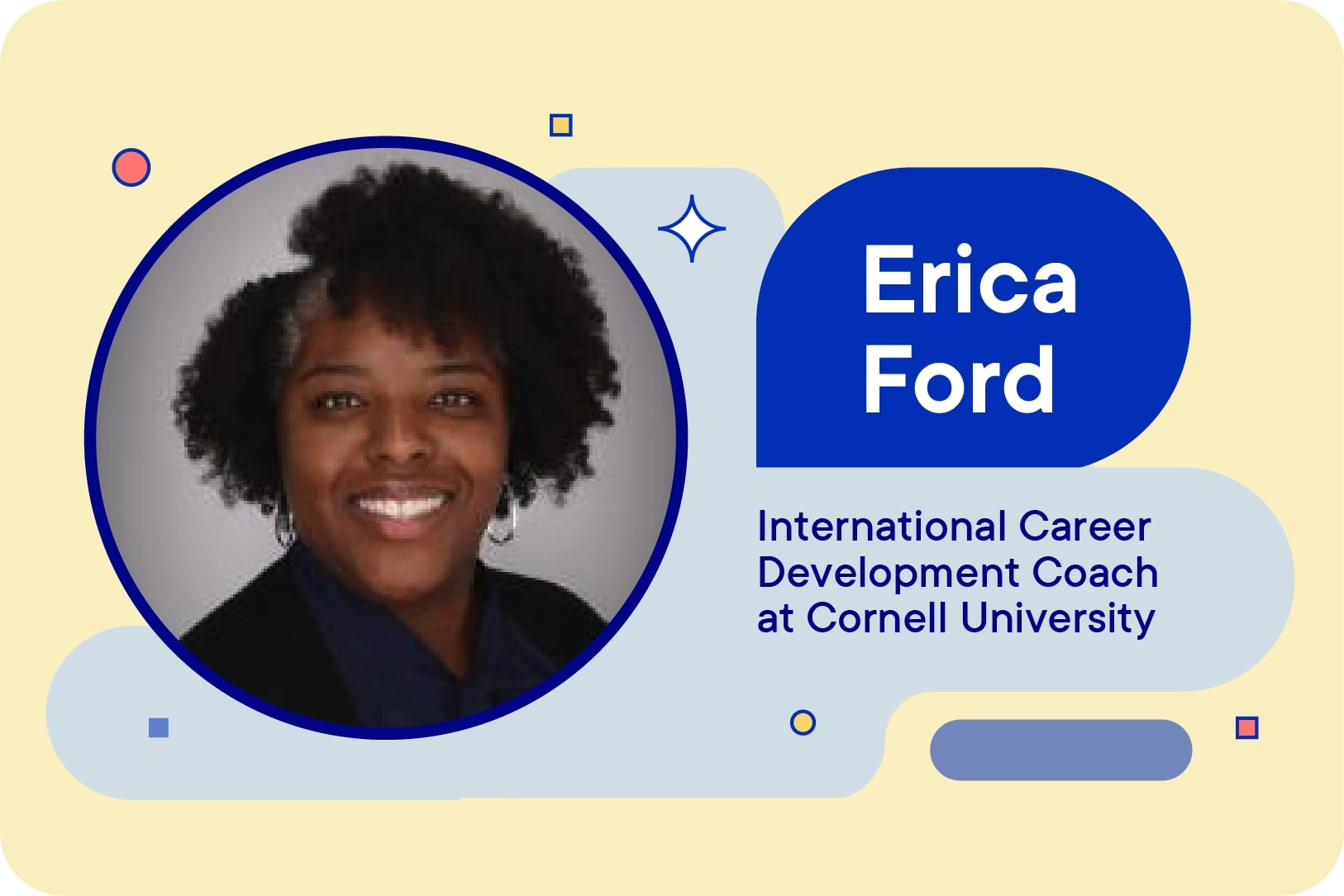This blog post was co-authored by Erica Ford, International Career Development Coach at Cornell University.
Being an international student comes with unique challenges when it’s time for job hunting. There will be many potential career paths to pursue, so having a sense of direction with clear goals will help you find jobs that are a good fit for you.
Start your career search with self-exploration
Building a career is like building a house. You need a strong foundation that will provide direction and motivation for your career decisions. To build this foundation, consider what motivates you to begin your career. What brought you here to the US to pursue an education? What are you hoping to accomplish and for whom?
Next, take inventory of your skills, interests, strengths, and values so that you can look for careers that align. You need to know your skills and strengths in order to discover potential career paths and areas of growth. Having a clear idea of your interests and values helps ensure you are on a career path that will bring joy and a sense of purpose. Self-exploration and assessment will also help you to apply for jobs that align well with your interests. Understanding your skills will help you to explain them well through job applications.
Once you establish a strong foundation through self-discovery, you are ready to pinpoint specific jobs of interest. Identify job titles, locations, and companies that fit your aspirations. Then, you can set clear goals for your career after graduation. For example, if you know you will want an H-1B visa sponsor in the future, start looking for companies that offer sponsorship now. If you are seeking internships, it may help to target companies that offer you long-term sponsorship prospects.
When you are in the initial process of researching possible jobs in the US, consider these questions:
- How long do you want to stay in the US?
- What are your salary expectations or goals?
- Do you prefer working alone or in a group?
- Do you have location preferences (cities, states)?
- Which of your preferences are not negotiable?
How to decode job titles in the US as an international student
Learn what different job titles and roles really mean in the US so you can find the ones that fit. Then, you can tailor your resume to match the job description and role very specifically. Unfortunately, job descriptions in the US can be vague or unclear. For example, a job description may state that 2-3 years of experience is required for the role, but that can include informal experiences like volunteer positions and academic projects.
You can use networking to explore roles that you may be interested in. Ask upperclassmen and alumni what their job title is and what they actually do on a daily basis at work. In some cases, you may also be able to reach out directly to a company to ask for clarification if you have specific questions about the job description. When possible, try to connect with companies through events happening at your school, such as employer information sessions and career fairs.
Learn how to get a job or internship as an international student when you have no experience yet.
Narrowing down which job opportunities to apply for
Job applications take time and effort to do well and thoroughly. Therefore, students should be selective about which jobs they apply for rather than applying indiscriminately. After you have dedicated time to exploring and researching job roles in the US, you should have a solid list of jobs that you want to apply to.
Use the 3-layer strategy when deciding which jobs to apply for. Out of every 10 jobs you apply for:
- Apply for 6-7 ideal jobs based on your goals, interests, etc.
- Apply for 2-3 less than ideal jobs that meet many but not all of your goals
- Apply to 1 job that is not ideal but OK for you
International students face additional pressures and have strict deadlines of when they need to apply for work authorization and when they have to start working. Therefore, it’s helpful to give yourself as many options as possible and not get too focused on only one option. Don’t try to force yourself into one path when there could be other opportunities that you may be missing. When using the 3-layer strategy, try to diversify the types of jobs you are applying to. Consider diversifying based on these characteristics:
- Company size
- Location
- Industry
- Salary
How to get help if you are stuck in your job search
International students at Cornell University who come to Career Services are often seeking help because they are stuck in their job search or don’t know where to begin. If you’re feeling stuck, start by visiting your university’s career center. They will likely have career coaches or advisors who can provide one-on-one support based on your specific goals and interests. Lastly, as you study in the US, build your network by getting to know your professors, alumni, and classmates. They can help you to navigate the job search, discover opportunities and, in the best-case scenario, provide referrals or letters of recommendation. Start networking early and think of ways to give back and help others, too!
Wrap up
Researching career opportunities in the US as an international student can feel overwhelming. It’s a large country with many possible career paths for college graduates. It’s important to take time to reflect on your goals before you begin your job search. If you are ever feeling stuck or unsure, check in with your goals and realign your actions to match. When choosing which jobs to apply for, think about whether the job description complements your skills, strengths, and values. These are important factors for long-term satisfaction with your career.

